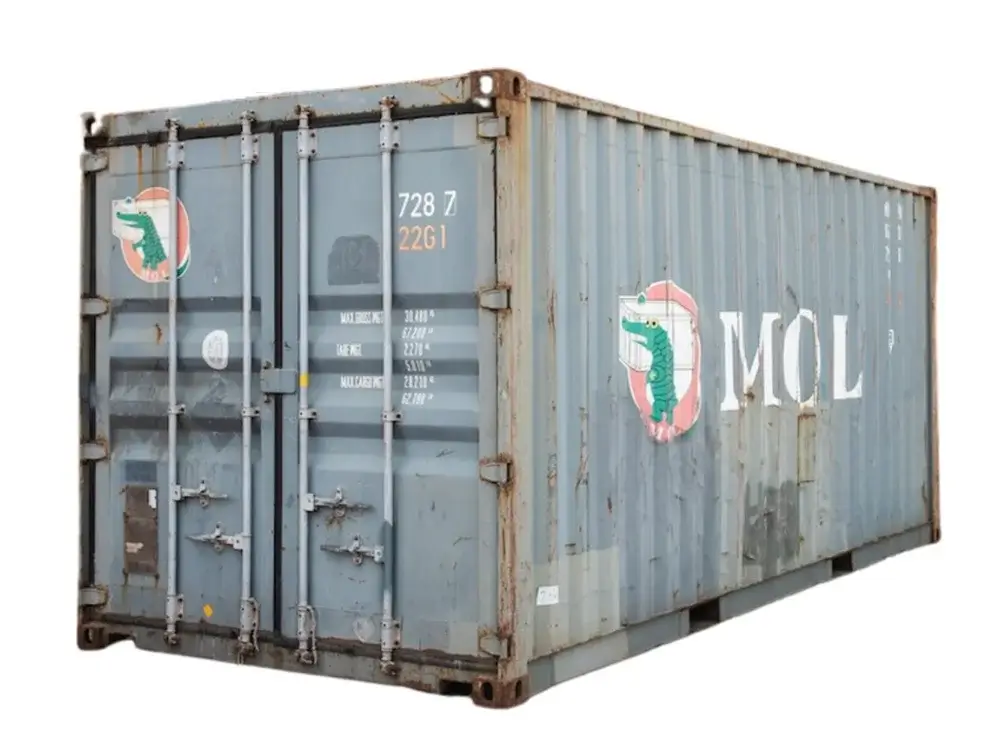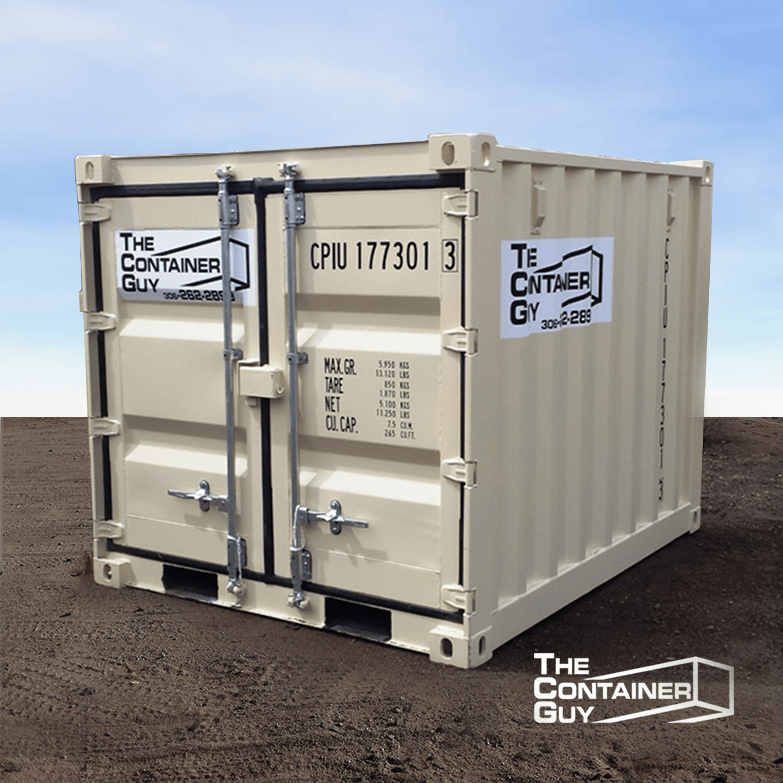Whatever You Need to Know About Shipping Containers and Their Practical Applications
Shipping containers have advanced from plain tools for transportation to flexible frameworks with numerous sensible applications. Their durable style and common sizing make them perfect for a variety of uses beyond delivery. From cutting-edge real estate remedies to lasting farming, their flexibility is noteworthy. The possibilities do not finish there. Exploring their numerous functions reveals surprising insights right into creative remedies and modern-day obstacles. What various other duties could these containers play in today's world?
The Layout and Framework of Shipping Containers

Inside, containers are created to maximize space, commonly featuring wooden or steel floor covering that can support substantial weight. Air flow systems may be incorporated to prevent wetness buildup, which is essential for sensitive cargo. Furthermore, enhanced edges permit very easy handling by cranes and forklifts, facilitating seamless loading and discharging. This thoughtful design and structure contribute to the containers' flexibility across numerous shipping and storage space applications.
Advantages of Utilizing Shipping Containers
While lots of transport methods have their benefits, the use of shipping containers stands apart as a result of their unparalleled adaptability and effectiveness. Shipping containers provide a standardized size, making them easy to stack and move throughout different modes of transport, consisting of trains, vehicles, and ships. This standardization reduces filling and dumping times, therefore enhancing general efficiency.
Additionally, shipping containers are built from resilient materials, giving durable protection for goods during transportation. They are weather-resistant and safe, minimizing the danger of damage from ecological aspects or theft. Additionally, the modular style of delivery containers enables very easy modification, making it possible for companies to adjust them for numerous objectives, such as storage space or mobile offices.
Ultimately, their transportability and cost-effectiveness make shipping containers an attractive option for organizations aiming to enhance logistics and supply chain procedures. These benefits contribute to the growing popularity of delivery containers in different markets.
Imaginative Real Estate Solutions With Shipping Containers
Cutting-edge real estate remedies have actually arised as an amazing application of shipping containers, leveraging their integral toughness for residential usage. These functional frameworks use a lasting alternative to typical building materials, typically at a portion of the expense. Designers and designers have changed containers right into fashionable, practical homes, providing to varied way of lives and choices.

Shipping containers are environmentally pleasant, promoting recycling and minimizing waste. Many jobs concentrate on energy effectiveness, integrating green roof coverings and solar panels. As urbanization increases, these cutting-edge real estate remedies provide a sensible response to housing shortages while promoting an one-of-a-kind architectural aesthetic.
Shipping Containers in Retail and Pop-Up Shops
A growing variety of sellers are turning to delivering containers as a dynamic remedy for pop-up stores and retail rooms. These flexible structures provide a cost-efficient alternative to conventional stores, enabling companies to produce special, distinctive atmospheres that draw in customers. Their modular design allows simple transport and installment, making them suitable for seasonal or temporary retail places.
Stores can tailor delivery containers to show their brand name identification, changing them into aesthetically appealing shops that attract attention in congested markets. The compact nature of containers additionally motivates effective use area, allowing for innovative designs that maximize customer flow and involvement. Shipping containers can be positioned in non-traditional places, such as metropolitan parks or uninhabited whole lots, increasing ease of access and foot website traffic.

As the retail landscape advances, delivering containers provide a adaptable and cutting-edge remedy that fulfills the demands of modern customers while boosting the shopping experience.
Lasting Farming Practices Utilizing Shipping Containers
Lasting farming methods significantly incorporate shipping containers as cutting-edge solutions for farming - shipping container storage. These container ranches utilize hydroponics to make the most of room and resource performance, offering a cost-efficient strategy to food manufacturing. By transforming delivery containers right into agricultural centers, farmers can deal with food safety and environmental issues at the same time
Container Farming Benefits
While conventional farming encounters challenges such as land shortage and environment change, container farming presents a viable option that optimizes space and resources. This ingenious technique allows for year-round crop production in controlled environments, minimizing dependence on climate condition. Container farms make use of less water than conventional farming, promoting sustainability and preservation. They can be developed in metropolitan areas, bringing fresh fruit and vegetables closer to consumers and lowering transport emissions. Additionally, the modular nature of delivery containers allows scalability, allowing farmers to readjust operations based on need. Container farming additionally decreases pesticide usage by producing a confined ecological community, eventually enhancing food security. As city populaces expand, my sources container farming emerges as a functional remedy to fulfill the boosting need for regional, lasting food sources.
Hydroponics in Containers
Hydroponics, which enables plants to grow without dirt by using nutrient-rich water, prospers within the confines of delivery containers, making it an ideal method for urban agriculture. These containers create a regulated setting that optimizes light, humidity, and temperature level, allowing year-round farming. With minimal area in urban areas, shipping containers provide a scalable service for growing fresh fruit and vegetables. Hydroponic systems within containers can include different strategies, such as nutrient film strategy (NFT) and deep water society (DWC), which maximize yield while decreasing water usage. This innovative technique not only enhances food safety however also minimizes the carbon impact connected with standard farming approaches. As a result, hydroponics in containers represents a forward-thinking solution for lasting metropolitan food manufacturing.
Cost-efficient Farming Solutions
As food manufacturing encounters raising obstacles as a result of environment change and urbanization, shipping containers become an affordable solution for farming. These versatile frameworks can be repurposed for various sustainable farming practices, such as hydroponics and upright farming. By using regulated settings within containers, farmers can enhance growth cycles and lower resource consumption, including water and plant foods. Furthermore, delivering containers can be purposefully put in metropolitan locations, minimizing transport costs and boosting access to fresh produce. Their modular nature enables scalability, allowing farmers to increase procedures as need grows. In addition, repurposing containers adds to throw away decrease, lining up with eco-friendly agricultural efforts. On the whole, delivering containers present ingenious opportunities for effective and sustainable food manufacturing.
Emergency and Catastrophe Relief Applications of Shipping Containers

Organizations frequently utilize shipping containers to develop mobile clinics or area hospitals, ensuring that healthcare reaches those in requirement. Furthermore, they can be changed right into command facilities for coordinating rescue procedures, thereby boosting organizational efficiency during dilemmas.
Containers can be changed to keep vital items such as clothing, food, and water, guarding supplies up until they are dispersed. Their mobility enables them to be quickly carried to numerous locations, ensuring that help gets here where it is most urgently needed. Overall, shipping containers play a pivotal function in enhancing the performance of disaster relief efforts worldwide.
Often Asked Inquiries
Just How Are Shipping Containers Transported From One Place to An Additional?
Shipping containers are carried via ships, trucks, and trains, using cranes for unloading and filling. This multi-modal transport system ensures efficient movement across land and sea, linking global supply chains and helping with worldwide trade.
What Is the Typical Life Expectancy of a Delivery Container?
The average life expectancy of a delivery container generally ranges from 10 to 25 years, relying on upkeep, usage, and environmental aspects. Correct website here care can prolong their use, while neglect might bring about damage and damage.
Can Shipping Containers Be Modified for Different Uses?
Yes, delivering containers can be customized for different uses. They function as homes, workplaces, pop-up stores, and storage units. Their flexibility enables innovative adaptations, making them suitable for a vast array of applications.
Are Shipping Containers Eco-friendly?
Shipping containers can be eco-friendly, as they promote repurposing and recycling. Their durability minimizes waste, while their use in alternate real estate and companies minimizes the requirement for new products, adding to lasting methods.
Exactly how Do I Select the Right Size Shipping Container?
To choose the ideal find more dimension delivery container, one must analyze storage needs, take into consideration the desired use, and assess area schedule - shipping containers for sale near me. Typical sizes include 20-foot and 40-foot containers, each offering various storage and transport demands successfully
Ingenious real estate options have actually arised as an exciting application of shipping containers, leveraging their fundamental toughness for property usage. The flexibility of shipping containers permits for imaginative designs, from single-unit dwellings to complex multi-container arrangements. Sustainable farming practices progressively incorporate delivery containers as cutting-edge remedies for farming. Furthermore, the modular nature of shipping containers allows scalability, allowing farmers to adjust procedures based on demand. Hydroponics, which permits plants to expand without dirt by using nutrient-rich water, grows within the confines of shipping containers, making it an excellent approach for metropolitan farming.